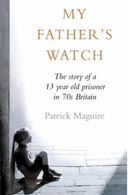
My Father's Watch
by Patrick Maguire with Carlo Gébler
448pp, Fourth Estate, £16.99
I started writing this as Parliament voted on whether to give the government the power to detain people for 42 days. I hope the Labour MPs who lined up behind Gordon Brown and Jacqui Smith had troubled themselves to read My Father's Watch - the story of an innocent boy's arrest and imprisonment. It's unlikely, of course. History, even recent history, has never been New Labour's strong point. Indeed the party's anti-historicism extends not just to a snub to the lessons of history but to a neurotic need to challenge history, to prove history wrong. Yes, we know this course of action led to disaster in the past, but we are better than our predecessors. This time it will be different.
And of course it never is. In 1974, in response to the IRA campaign in England, the Labour government of the day rushed into law the Prevention of Terrorism Act (with "Temporary Provisions" laughably appended), which allowed for the internal exile of Irish people and detention for seven days' questioning (up from three). It is a shameful but unsung irony that Patrick Maguire, author of this sad but compelling memoir, was one of the first to be detained for this extended period. He was charged and convicted of a crime he not only didn't commit but that was never actually committed: participation in running an alleged IRA bomb factory in his west London home.
Patrick and his family were not alone. In the 1970s and 80s the Guildford Four, Judith Ward, the Birmingham Six and others all went through hell, spending years in jail for crimes it is now acknowledged they never committed. Patrick Maguire was 13 when he was taken to a police cell with his brothers, Vincent and John. First Vincent was questioned, then John. "Now I was alone," Patrick writes. "I date the end of my childhood from that moment."
Patrick's mother Annie was paraded in the media as "Evil Annie", organiser of this imagined house of terrorists. No explosives were found, no bomb-making paraphernalia, unless black duct tape and other household goods can be counted as such (and of course they were). Crackpot science helped send Patrick, his mother, his father and a brother to jail. Patrick got four years, which was served in adult prisons. The Maguires did their time - hard time - and they were released, one by one, in the late 70s and 80s to rebuild their family and their shattered lives as best they could. Hardly anyone took any notice, and for years Annie Maguire and her family lived under the stigma of the tabloids' cruel depictions.
It was not until the spectacular release of the Guildford Four in 1989 - when, in a blaze of publicity, government lawyers admitted that the evidence used to convict them was "concocted" by police officers who "seriously misled the court" - that the British public was forced to confront what had been done in its name. There was a brief - all too brief, as it turned out - period of establishment breast-beating. How could this have happened?
Irish people did not need the public inquiry set up under Lord May to provide the answer. It happened because of prejudice - against the Irish community specifically, against working-class Irish in particular; brutality - Irish prisoners had been threatened with guns and physical violence; they had been kicked, slapped, punched and verbally abused; stupidity - on the part of the police, the judiciary and the legal profession; compliant media - or worse: some papers actively fomented hatred of the accused; panic - there were bombings so politicians had to do something, now; science - which was said at trial to prove conclusively that the accused had handled explosives and which subsequently was rubbished as the work of incompetents and buffoons; and finally because of insufficient safeguards on the treatment of suspects, who were denied contact with lawyers and interrogated for extended periods. Is this ringing any bells, Mr Brown? Ms Smith?
Had the police been less prejudiced, had the lawyers charged with the prosecution been less bigoted, had the judges been fair, they might have noticed that Patrick Maguire's family hardly fitted the IRA profile. Annie had no truck with militant republicanism; her gas-fitter husband was a drinker, not an activist. Patrick was a working-class west London boy. Is he Irish or English, the police ask him. He's not sure himself. He speaks with a London accent and he supports QPR, but his mother was born in Belfast and all his relations are Irish. On his bedroom wall a small Union flag is pinned up alongside an Irish tricolour.
My Father's Watch - the title comes from the watch Patrick used to wind for his father and which his father gave to him in the cells after the family were convicted, along with the tragic Guiseppe Conlon, who was to die in prison - is a devastating chronicle of injustice and blighted lives. It is moving and sad, and told without bitterness. Its power derives from Patrick himself, from the man he has become, a damaged survivor with the burdens of a past he cannot shrug off; and from the awfulness of the tale he tells, and the foreboding note it strikes in the reader.
The book is beautifully written. Credit must go to Patrick's collaborator Carlo Gébler, the hallmark of whose work as a novelist is a quiet emotionalism. Gébler's writing hasn't always been to my taste - I keep hoping to turn the page and find a robustness that never materialises - but his work here is stunning, his sensitivity particularly suited to the impressionistic rendering of Patrick's childhood and the nightmare into which the boy is plunged. It's not a happy story, but it is a necessary one.
· Ronan Bennett's novel Zugzwang is published by Bloomsbury

